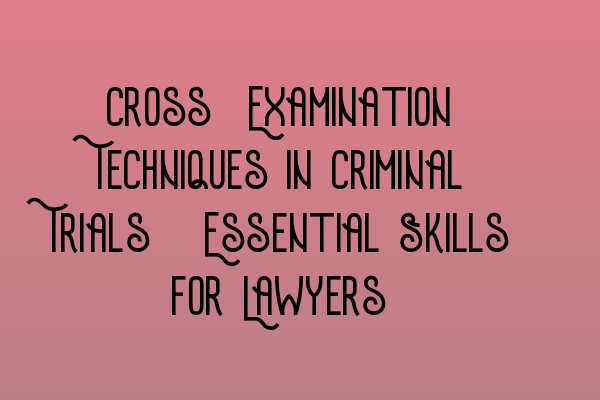Cross-Examination Techniques in Criminal Trials: Essential Skills for Lawyers
Welcome to SQE Criminal Law & Practice Law UK’s blog! In today’s post, we will discuss the cross-examination techniques that are essential for lawyers in criminal trials. Cross-examination is a critical aspect of the trial process, and mastering this skill can significantly impact the outcome of a case.
The Importance of Cross-Examination
Cross-examination is the opportunity for the defense to question the prosecution’s witnesses and challenge their credibility, reliability, and the accuracy of their testimony. It allows lawyers to cast doubt on the prosecution’s case and present alternative interpretations of the events in question.
Effective cross-examination can weaken the prosecution’s case and create reasonable doubt in the minds of the jury. It requires strategic planning, strong communication skills, and thorough knowledge of the case and the relevant laws. To assist with your exam preparation, check out our SQE 1 Practice Exam Questions and SQE 1 Practice Mocks FLK1 FLK2 articles.
Key Techniques for Effective Cross-Examination
1. Leading Questions: By phrasing questions in a way that suggests the desired answer, lawyers can control the witness’s responses and shape the narrative in their favor. However, leading questions should be used carefully to avoid objections or appearing manipulative.
2. Impeachment: Impeachment involves challenging the witness’s credibility by presenting evidence that contradicts their testimony or exposes biases, inconsistencies, or motives to lie. This technique can significantly undermine the witness’s credibility in the eyes of the jury.
3. Reputation Evidence: Lawyers can also use reputation evidence to discredit a witness. This involves presenting evidence that the witness has a history of dishonesty or unreliability, making it harder for the jury to accept their testimony.
4. Controlled Aggression: While aggression should be controlled and professional, assertive questioning can compel witnesses to provide more honest or favorable answers. It’s essential not to cross the line into rudeness or harassment, as it can negatively impact the lawyer’s credibility.
5. Controlling the Pace: Lawyers should control the pace of cross-examination to maintain the jury’s engagement and focus on important points. Rapid-fire questioning can be used to rattle a witness, while slower pacing can be effective for building tension and emphasizing critical moments.
To excel in cross-examination, lawyers need to understand the specific rules and procedures, case law, and legal principles. Our SQE 2 Preparation Courses and SQE 1 Preparation Courses will equip you with the knowledge and skills necessary for success in your exams.
Conclusion
Mastering cross-examination techniques is crucial for lawyers practicing criminal law. Effective cross-examination can sway the jury, challenge the prosecution’s case, and ultimately secure a favorable outcome for the defendant. It is a skill that requires practice, preparation, and a deep understanding of the legal principles involved.
Stay tuned to our blog for more insightful articles on criminal law and exam preparation. For the latest updates on SRA SQE exam dates, please refer to our article on SRA SQE Exam Dates.
